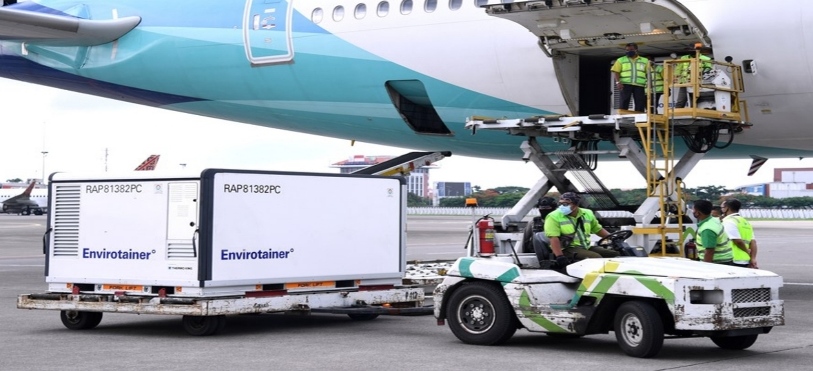China Trying To Woe ASEAN By Buying to $150 Billion Worth Of Agricultural Goods

A plane carrying the third batch raw materials for Sinovac coronavirus vaccines arrives at Sukarno-Hatta International Airport in Tangerang, Indonesia, Jan. 12, 2021.
President Xi Jinping announced has announced several major initiatives to boost economic cooperation between China and the Association of Southeast Asian Nations (ASEAN), including striving to import $150 billion worth of agricultural products from ASEAN countries over the next five years, offering additional financial assistance to the bloc’s economic recovery and anti-epidemic efforts, as well as providing advanced technology.
Xi made the remarks while attending and chairing a special summit commemorating the 30th anniversary of ASEAN-China dialogue relations on Monday via video link.
During the meeting, the two sides jointly announced the establishment of a China-ASEAN Comprehensive Strategic Partnership, a new milestone for the relationship that will inject new impetus into the development of both the region and the world.
On the economic front, Xi proposed several initiatives for deepening cooperation between China and ASEAN, including calling for working toward a new round of upgrade of the China-ASEAN Free Trade Area at an early date, and increasing imports from the bloc.
China has a vast domestic market that will always be open to ASEAN countries, Xi said, adding that China is ready to import more quality products from ASEAN countries, including buying up to $150 billion worth of agricultural products from ASEAN in the next five years.
Also, Xi announced that China is ready to provide ASEAN with another $1.5 billion of development assistance in the next three years to support ASEAN countries’ fight against COVID-19 and economic recovery.
To boost cooperation in technology, Xi also said that China will launch the China-ASEAN Science, Technology and Innovation Enhancing Program, and will provide 1,000 items of advanced and applicable technology to ASEAN and support a program for 300 young scientists from ASEAN to come to China for exchanges in the next five years.
ASEAN groups Brunei, Cambodia, Indonesia, Laos, Malaysia, Myanmar, the Philippines, Singapore, Thailand and Vietnam. China and the bloc established dialogue relations in 1991.
People walk out of the venue of the 18th China-ASEAN Expo in Nanning, capital of south China’s Guangxi Zhuang Autonomous Region, Sept. 13, 2021.
China and ASEAN have already had highly integrated economic ties over the past three decades, with the two already becoming each other’s largest trading partner, said Shen Minghui, a research fellow at the Institute of Asia-Pacific and Global Strategy of Chinese Academy of Social Sciences.
Over the past three decades, China-ASEAN trade has jumped from less than $8 billion to $684.6 billion. In 2009, China overtook Japan and the EU, and it then became the first and largest trading partner of ASEAN for 12 consecutive years.
Shen noted that as the COVID-19 is still spreading in many parts of the world, China’s support would be vital to ASEAN countries’ post-epidemic economic recoveries. Shen expected that apart from medical assistance, China might also offer convenience in areas such as personnel exchanges and customs clearance for the bloc.
China has provided all ASEAN member states with over 300 million COVID-19 vaccines and a large volume of emergency medical supplies. China has also sent medical expert teams to help build virus-testing labs and worked on vaccine trials with several ASEAN member states.
Shen further noted that China-ASEAN relations have quite promising prospects in cooperation in the digital economy and related technology, especially in new infrastructure sectors such as 5G.
“Political interference is also less between China and ASEAN countries in the sector, which might become a new driving force of bilateral exchanges,” Shen added.
Shen also called for more ASEAN countries to finish preparations for the Regional Comprehensive Economic Partnership (RCEP), a landmark achievement of regional cooperation among 15 Asia-Pacific nations, to push regional development to a new high.




